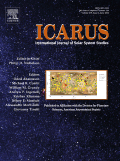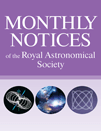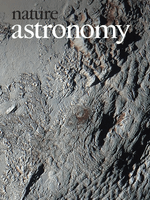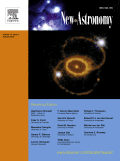
Open Astronomy
metrics 2024
Exploring the Universe, One Article at a Time.
Introduction
Open Astronomy is a pioneering journal dedicated to the expansive field of astronomy and astrophysics, published by De Gruyter Poland Sp. z o.o. since 2016. This Open Access journal aims to facilitate the dissemination of high-quality research and stimulate scholarly dialogue among researchers, professionals, and students on a global scale. With a commitment to fostering the accessibility of academic knowledge, Open Astronomy has established itself within reputable categories, achieving a Q3 ranking in Astronomy and Astrophysics and a Q4 position in Space and Planetary Science for 2023. The journal also ranks 66th out of 90 in the Astronomy and Astrophysics category and 84th out of 104 in Space and Planetary Science according to Scopus metrics, indicating its growing influence in the scientific community. Based in Warsaw, Poland, Open Astronomy invites contributions that explore novel discoveries, innovative methodologies, and theoretical advances in the field, making it a vital resource for anyone passionate about the cosmos.
Metrics 2024
 -
- 0.50
0.50 0.60
0.60 -
-Metrics History
Rank 2024
IF (Web Of Science)
JCI (Web Of Science)
Quartile History
Similar Journals

Journal of the Korean Astronomical Society
Charting New Frontiers: The Pulse of Astronomical ResearchWelcome to the Journal of the Korean Astronomical Society, an esteemed publication dedicated to advancing the fields of Astronomy and Astrophysics as well as Space and Planetary Science. Established in 1993 and under the reputable auspices of the Korean Astronomical Society, this journal serves as a vital platform for researchers and scholars from South Korea and around the globe to disseminate innovative findings and critical insights. With a commendable Q2 ranking in Astronomy and Astrophysics and a Q3 ranking in Space and Planetary Science, this journal is positioned among the influential voices in its fields, fostering collaboration and knowledge exchange. The journal's rigorous peer-review process ensures that published works contribute significantly to ongoing discussions and developments in astronomical research. While currently not an open-access journal, it remains accessible to the academic community, encouraging readers to stay abreast of the latest advancements in the sciences that elucidate the universe's complexities. Join us in exploring the cosmos through cutting-edge research and scholarly discussion that propels the field forward.

Earth and Planetary Physics
Pioneering Discoveries in Space and Planetary ScienceEarth and Planetary Physics, published by SCIENCE PRESS, is a distinguished open-access journal that has been a vital resource for the scientific community since its inception in 2017. With both ISSN and E-ISSN 2096-3955, this journal contributes significantly to the fields of Astronomy and Astrophysics, Atmospheric Science, and Space and Planetary Science, consistently holding a Q2 quartile ranking across these categories as of 2023. Based in the United States, its editorial board consists of renowned experts dedicated to advancing the understanding of planetary phenomena and Earth processes. The journal prides itself on its rigorous peer-review process and broad readership, facilitating the dissemination of cutting-edge research and innovative methodologies. This commitment is reflected in its strong Scopus rankings, positioning it competitively within its scope—rank #33 in Astronomy and Astrophysics and rank #40 in Space and Planetary Science. As an open-access journal, Earth and Planetary Physics is committed to providing free and global access to high-quality research, thereby enhancing visibility and impact for its authors while catering to researchers, professionals, and students eager to explore the intricacies of our planet and beyond.

ICARUS
Elevating Scientific Dialogue in the Realm of Astronomy.ICARUS is a prominent peer-reviewed journal dedicated to advancing knowledge in the realm of Astronomy and Astrophysics, as well as Space and Planetary Science. Published by Academic Press Inc, Elsevier Science, this esteemed journal has been contributing to the scientific discourse since 1962 and will continue to do so well into 2024. With an impressive impact factor placing it in the Q2 quartile, ICARUS ranks among the top journals in its field, standing appropriately at #22 out of 90 in Astronomy and Astrophysics and #27 out of 104 in Space and Planetary Science according to Scopus metrics. Researchers, professionals, and students alike benefit from its comprehensive scope, which encompasses a wide array of topics related to planetary processes, space exploration, and astrophysical phenomena. Although it does not currently offer open access, the journal remains a critical resource for scholars seeking to disseminate their findings and engage with cutting-edge research in the exciting fields of astronomy and planetary science.

OBSERVATORY
Fostering Collaboration: Connecting Scholars in the Quest for Cosmic UnderstandingOBSERVATORY, an esteemed journal in the realms of Astronomy and Space and Planetary Science, is published from the Rutherford Appleton Laboratory in the United Kingdom. With an ISSN of 0029-7704, this journal has provided a platform for innovative research and findings, particularly during its active publishing years from 1996 to 2013, 2015, and from 2017 to 2024. Although classified in the lower quartiles (Q4) in the latest 2023 category rankings for Astronomy and Astrophysics and Space and Planetary Science, the journal serves as a vital resource for researchers and students aiming to contribute to these fields. While it currently does not offer open access options, it continues to attract attention for its focus on both theoretical and applied aspects of astronomy. With a growing compilation of research, it aims to foster collaboration and knowledge dissemination among scholars dedicated to unraveling the complexities of our universe.

REVISTA MEXICANA DE ASTRONOMIA Y ASTROFISICA
Fostering Innovation in Astronomy and AstrophysicsRevista Mexicana de Astronomía y Astrofísica, published by the Universidad Nacional Autónoma de México (INSTITUTO DE ASTRONOMÍA), is a prominent academic journal dedicated to advancing the knowledge and understanding of astronomy and astrophysics. As a Q3-ranked journal in both Astronomy and Astrophysics, and Space and Planetary Science in 2023, it serves as an invaluable platform for researchers and professionals within these fields. With an ISSN of 0185-1101, this journal seeks to foster innovative research and dialogue among scholars, presenting groundbreaking studies spanning from theoretical astrophysics to observational astronomy. Although it does not operate under an open-access model, the journal remains vital for its contributions to scientific literature from Mexico, with articles converging over several decades from 1996 to 2024. By offering insights into the latest findings and methodologies, Revista Mexicana de Astronomía y Astrofísica not only enhances the academic landscape but also inspires future generations of scientists and students passionate about unraveling the mysteries of the universe.

JOURNAL OF ASTROPHYSICS AND ASTRONOMY
Exploring the Cosmos, One Discovery at a Time.JOURNAL OF ASTROPHYSICS AND ASTRONOMY, published by the Indian Academy of Sciences, stands as a pivotal resource for researchers and professionals in the fields of astrophysics and astronomy, with a rich history of publication dating back to 1980. This esteemed journal aims to disseminate high-quality research, fostering advancements in how we understand celestial phenomena, space environments, and planetary sciences. With a current Impact Factor that places it in the Q3 category for both Astronomy and Astrophysics and Space and Planetary Science, it maintains a crucial role in the global academic community, particularly within India. Although not an open access journal, its scholarly contributions are vital for both emerging and established researchers striving to push the boundaries of our knowledge in the cosmos. The journal is indexed in Scopus, ranking 56th in Astronomy and Astrophysics and 72nd in Space and Planetary Science, reflecting its ongoing significance and reach in the scientific dialogue.

Bulgarian Astronomical Journal
Where Emerging Ideas Meet Stellar ScienceThe Bulgarian Astronomical Journal, published by the BULGARIAN ACADEMY OF SCIENCES, INSTITUTE OF ASTRONOMY, serves as a vital platform for the dissemination of research in the field of Astronomy and Astrophysics. With the ISSN 1313-2709 and E-ISSN 1314-5592, this journal has been pivotal in showcasing original studies and advancements in astronomical sciences from 2014 and will continue to do so through 2025. Although categorized in Q4 within the ambit of Astronomy and Astrophysics, it provides essential insights and innovative findings, making significant contributions to the global academic community. Positioned in the lower quartile of Scopus rankings, recognized as #87 out of 90, it offers an opportunity for burgeoning researchers and seasoned professionals alike to engage with emerging ideas and trends in the discipline. While it currently does not feature an open access model, readers and contributors can anticipate a rich exchange of scientific knowledge that fosters collaboration within the astronomy community.

MONTHLY NOTICES OF THE ROYAL ASTRONOMICAL SOCIETY
Pioneering Insights in Space and Planetary Science.The MONTHLY NOTICES OF THE ROYAL ASTRONOMICAL SOCIETY (MNRAS), published by Oxford University Press, serves as a premier platform for the dissemination of significant research in the fields of Astronomy, Astrophysics, and Space and Planetary Science. Established in 1913 and with an impressive impact factor reflected in its 2023 Q1 rankings—13th in Earth and Planetary Sciences and 14th in Physics and Astronomy—this journal is renowned for its rigorous peer-reviewed articles, fostering advancements in our understanding of the universe. Researchers, professionals, and students alike benefit from its rich content, which spans a vast array of topics within its scope, from stellar dynamics to planetary formation. While the journal does not currently offer Open Access options, the scholarly contributions published herein are invaluable for pushing the boundaries of contemporary scientific inquiry and ensuring that the latest findings reach an engaged audience globally.

Nature Astronomy
Advancing Astronomy: Your Gateway to Cutting-Edge Research and Discoveries.Nature Astronomy, published by NATURE PORTFOLIO, stands at the forefront of the field of Astronomy and Astrophysics. Since its inception in 2016, this esteemed journal has rapidly ascended to a prestigious position, achieving a Q1 ranking in the Astronomy and Astrophysics category and securing an impressive 6th place out of 90 journals in the Scopus rankings, placing it in the 93rd percentile. With a focus on disseminating pioneering research, Nature Astronomy provides a vital platform for the dissemination of high-quality, impactful findings across various aspects of astronomical science. Researchers, professionals, and students alike will find a wealth of knowledge and innovative perspectives within its pages, enabling them to stay ahead in a rapidly evolving field. Although it does not offer open access, the journal's commitment to excellence and its influence in shaping the future of astronomical research make it an indispensable resource for anyone serious about advancing their understanding of the cosmos.

NEW ASTRONOMY
Elevating the Dialogue in Astronomy and AstrophysicsNEW ASTRONOMY, published by Elsevier, stands as a pivotal platform in the field of Astronomy and Astrophysics. With an ISSN of 1384-1076 and an E-ISSN of 1384-1092, this journal has solidified its reputation over its operational years, from 1996 to 2025. Located in the Netherlands, it ranks in the Q2 category for Astronomy and Astrophysics and Instrumentation, and Q3 for Space and Planetary Science, affirming its significant contribution to these disciplines. With a Scopus rank of #37/90 in Astronomy and Astrophysics and a respectable 59th percentile, this journal is essential for researchers and professionals seeking cutting-edge findings and methodologies. Although not open access, NEW ASTRONOMY remains dedicated to providing a rich repository of knowledge, featuring exceptional peer-reviewed articles that explore novel astronomical phenomena and advancements in instrumentation. Engaging with this journal will not only enhance your understanding of current trends in the cosmos but also contribute to the ongoing dialogue within these dynamic fields.